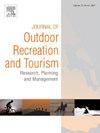是什么推动了水上娱乐爱好者的公众支持和政治消费主义行为?以南卡罗来纳州为例
IF 4.4
3区 管理学
Q1 HOSPITALITY, LEISURE, SPORT & TOURISM
Journal of Outdoor Recreation and Tourism-Research Planning and Management
Pub Date : 2025-08-25
DOI:10.1016/j.jort.2025.100940
引用次数: 0
摘要
水上娱乐人士与水质有着独特的联系,因为他们在休闲活动中与水生环境直接互动。对水质日益增长的关注促使一系列研究集中于了解环境条件和风险感知如何影响环境态度和保护行为。然而,问题仍然存在——水上游憩者的行为是否超出了特定活动的保护行为?为了解决这一差距,本研究调查了南卡罗来纳州的水上娱乐人士是否支持更严格的水管理政策,并参与政治消费主义行为(抵制和购买)。我们通过调查问卷收集数据,并采用多元回归和逻辑回归对数据进行分析。结果表明,风险认知是所有三种保护行为的关键驱动因素。此外,年龄似乎与他们对水管理政策的支持呈正相关,而与抵制和购买行为负相关。我们的发现有助于确定这些未被充分探索的保护行为的驱动因素。本文章由计算机程序翻译,如有差异,请以英文原文为准。
What drives public support and political consumerism behaviors among water-based recreationists? The case of South Carolina
Water recreationists have a unique connection to water quality, given their direct interaction with aquatic environments during leisure pursuits. Growing concerns about water quality have prompted a body of research focused on understanding how environmental conditions and risk perceptions influence environmental attitudes and conservation behaviors. Yet, the question remains—do water-based recreationists act beyond activity-specific conservation behaviors? To address this gap, this study examines whether water-based recreationists in South Carolina support stricter water management policies and participate in political consumerism behaviors (boycotting and buycotting). We collected data through survey questionnaires and employed multiple and logistic regressions for data analysis. The results showed that risk perceptions are a key driver of all three conservation behaviors. Furthermore, age appeared to be positively related to their support for water management policies, while negatively associated with boycotting and buycotting behaviors. Our findings contribute to identifying the drivers of these underexplored conservation behaviors.
求助全文
通过发布文献求助,成功后即可免费获取论文全文。
去求助
来源期刊

Journal of Outdoor Recreation and Tourism-Research Planning and Management
HOSPITALITY, LEISURE, SPORT & TOURISM-
CiteScore
6.70
自引率
5.30%
发文量
84
期刊介绍:
Journal of Outdoor Recreation and Tourism offers a dedicated outlet for research relevant to social sciences and natural resources. The journal publishes peer reviewed original research on all aspects of outdoor recreation planning and management, covering the entire spectrum of settings from wilderness to urban outdoor recreation opportunities. It also focuses on new products and findings in nature based tourism and park management. JORT is an interdisciplinary and transdisciplinary journal, articles may focus on any aspect of theory, method, or concept of outdoor recreation research, planning or management, and interdisciplinary work is especially welcome, and may be of a theoretical and/or a case study nature. Depending on the topic of investigation, articles may be positioned within one academic discipline, or draw from several disciplines in an integrative manner, with overarching relevance to social sciences and natural resources. JORT is international in scope and attracts scholars from all reaches of the world to facilitate the exchange of ideas. As such, the journal enhances understanding of scientific knowledge, empirical results, and practitioners'' needs. Therefore in JORT each article is accompanied by an executive summary, written by the editors or authors, highlighting the planning and management relevant aspects of the article.
 求助内容:
求助内容: 应助结果提醒方式:
应助结果提醒方式:


